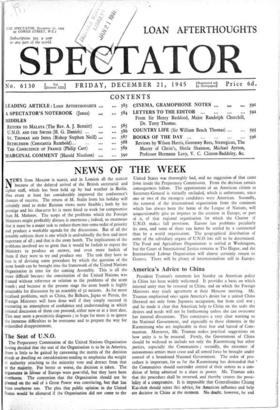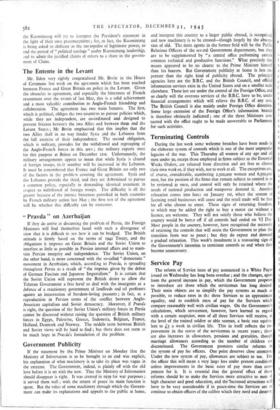America's Advice to China
President Truman's statement last Sunday on American policy in China has been widely welcomed. It provides a basis on which internal unity may be restored in China, and on which the Foreign Ministers may reach agreement at their Moscow meeting. Mr. Truman emphasised once again America's desire for a united China liberated not only from Japanese occupation, but from civil war ; and he made it clear that American help to China on the scale she desires and needs will not be forthcoming unless she can overcome her internal dissensions. This constitutes a very clear warning to the National Government, and especially to these elements in the Kuomintang who are implacable in their fear and hatred of Com- munism. Moreover, Mr. Truman makes practical suggestions on how unity is to be restored. Firstly, the Government of China should be widened to include not only the Kuomintang but other parties, especially the Communists ; secondly, the existence of autonomous armies must cease and all armed force be brought under control of a broadened National Government. The order of pro- cedure is important, for so far the Kuomintang has demanded that • the Communists should surrender control of their armies as a con- dition of being admitted to a share in power. Mr. Truman asks that the procedure shall be reversed, and thereby creates the possi- bility of a compromise. It is impossible that Generalissimo Chiang Kai-shek should reject this advice, for American influence and help are decisive in China at the moment. No doubt, however, he and
the Kuomintang will try to interpret the President's statement in the light of their own preconceptions ; for, in fact, the Kuomintang is being asked to abdicate as the monopolist of legitimate power, to end the period of " political tutelage " under Kuomintang leadership, and to admit the justified claims of others to a share in the govern- ment of China.































 Previous page
Previous page